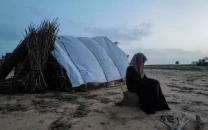Severe flooding in Southeast France causes damage, power outages
There have been no immediate reports of casualties but impacts of flooding have been extensive
1729328676-0/BeFunk_§-(33)1729328676-0-640x480.webp)
Parts of southeast France have experienced severe flooding, resulting in significant damage and widespread power outages after days of relentless rainfall.
Fortunately, there have been no immediate reports of casualties, but the impacts of the flooding have been extensive.
France's national weather service, Meteo France, issued a red flood alert for six departments south of Lyon on Thursday, indicating the seriousness of the situation.
However, by Friday, the alert was downgraded to orange, suggesting that water levels were expected to recede. The Ardeche region was particularly hard-hit, with reports of up to 700 millimeters of rain falling in just 48 hours—more than an entire year’s worth of rainfall for Paris, according to Environment Minister Agnès Pannier-Runacher.
Images broadcast on French news channels depicted chaotic scenes: vehicles, traffic signs, and even livestock being swept away by the floodwaters.
The A47 highway near Lyon was temporarily transformed into a rushing river, complicating efforts to navigate the area.
In response to the crisis, the French Interior Ministry deployed an additional 1,500 firefighters to assist in rescue and recovery operations across the affected regions.
The storm responsible for this deluge, known as Storm Kirk, has brought unprecedented rainfall to France, contributing to what experts believe could be a trend of increasingly frequent extreme weather events linked to climate change.
Last month, central Europe faced its worst flooding in over two decades, highlighting the growing threat posed by severe weather across the continent.
As France copes with the immediate aftermath of these floods, officials and experts are calling for heightened awareness and preparedness for future weather-related disasters.
Local residents have expressed frustration over the situation, recalling previous flooding events and calling for better infrastructure and emergency response systems to mitigate the impact of such disasters.
Givors, one of the worst-affected areas, has seen significant disruptions, with residents temporarily displaced from their homes as emergency services work to assess the damage and provide necessary aid.
Authorities continue to monitor the situation closely, providing updates on weather conditions and recovery efforts.
While the downgrade in the flood alert offers some relief, the long-term implications of such severe weather events are concerning, as scientists warn that climate change is likely to increase the frequency and severity of flooding in the future.
Previously, intense rainfall hit southern India, prompting weather officials to issue a red alert for flash floods and landslide while atleast 15 people have died in Meghalaya due to flooding and landslides, including seven from one family buried in the South Garo Hills district.
Meanwhile as recovery efforts progress in France, the government faces the challenge of addressing both the immediate needs of those affected by the floods and the larger issue of climate resilience in the face of increasingly severe weather patterns.
Community leaders are advocating for infrastructure improvements and better preparedness plans to safeguard against future flooding incidents, aiming to ensure that residents are better equipped to handle such extreme weather in the years to come.



















COMMENTS
Comments are moderated and generally will be posted if they are on-topic and not abusive.
For more information, please see our Comments FAQ